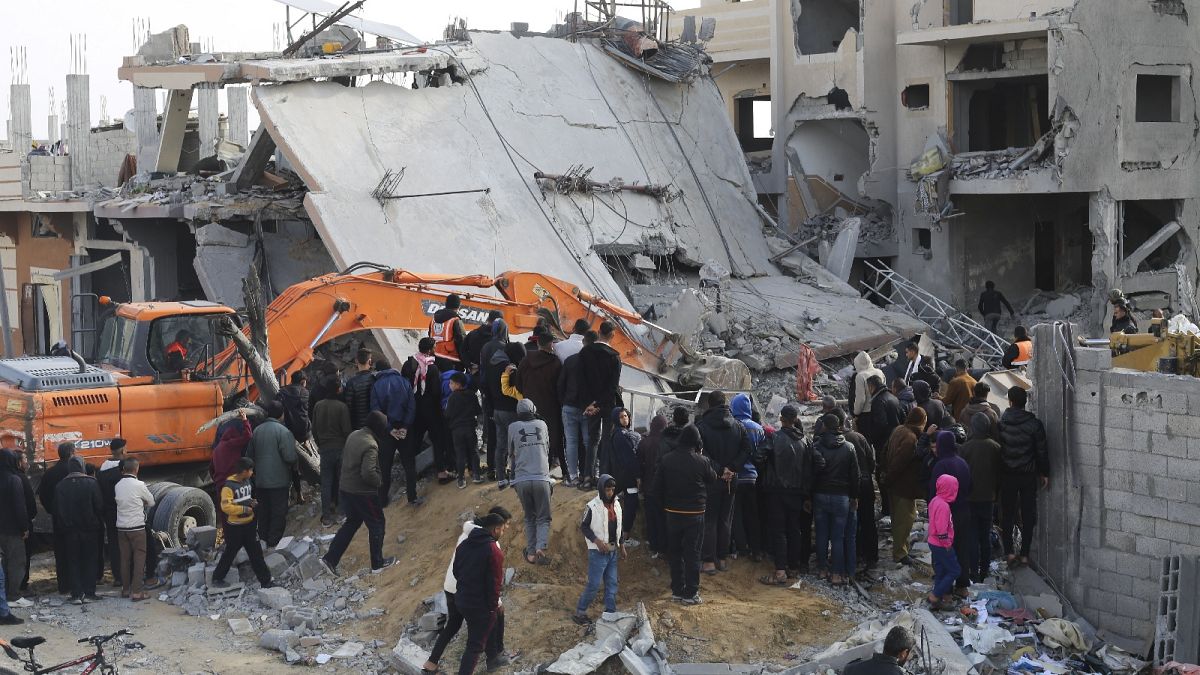
Two Israeli airstrikes on Rafah overnight killed at least 13 people, including nine members of the same family, according to hospital officials and relatives.
The number of Palestinians killed during the war in Gaza has surpassed 28,000 people, according to the Hamas-run Health Ministry in Gaza. A quarter of Gaza’s residents are starving. About 1,200 people, mostly civilians, were killed and around 250 abducted in Hamas’ attack on Israel on Oct. 7 that sparked the war.
The overnight strikes came after US President Joe Biden once again cautioned Israeli Prime Minister Benjamin Netanyahu against moving forward with a military operation into Gaza’s southernmost city without a “credible and executable plan” to protect around 1.4 million Palestinians sheltering there.
However, Israel’s defense minister said the country is “thoroughly planning” its promised ground invasion of Rafah, and Netanyahu vowed early Friday to reject “international dictates” on a long-term resolution of Israel’s conflict with the Palestinians.
Palestinians fleeing Rafah
Israel has identified Rafah as the last remaining Hamas stronghold in Gaza and vowed to continue its offensive there. An estimated 1.4 million Palestinians, more than half of Gaza’s population, has crammed into the city, most of them displaced people who fled fighting elsewhere in Gaza.
Israel has said it will evacuate the civilians before attacking, though international aid officials have said there is nowhere to go due to the vast devastation left behind by the offensive.
Palestinians are reportedly already moving out of that area due to intensifying Israeli strikes, according to UN humanitarian officials, and moving toward central areas around Deir al-Balah
UN spokesman Stephane Dujarric told reporters Friday about the reported movements toward Deir al-Balah, which is roughly 16 kilometres north of Rafah. He also described the lack of food in Rafah and elsewhere — especially in northern Gaza, the first target of the offensive, where large areas have been completely destroyed.
“In Rafah, humanitarian conditions have become increasingly severe, with continued reports of people stopping aid trucks to take food,” he said. “Vulnerable segments of the population including children, the elderly, and people with underlying health conditions, are particularly susceptible to the risk of malnutrition.”
Throughout Gaza, Dujarric said the delivery of aid is hindered by frequent border closures, longstanding import restrictions of goods into Gaza, damage to critical infrastructure, and the security situation.
Top UN court rejects motion for measures against Rafah offensive
Meanwhile, the International Court of Justice on Friday rejected an “urgent request” from South Africa to impose urgent measures to safeguard Rafah. It stressed, however, that Israel must respect earlier measures imposed late last month at a preliminary stage in a landmark genocide case.
The top UN court said in a statement that the “perilous situation” in Rafah “demands immediate and effective implementation of the provisional measures” that it ordered on Jan. 26.
It said no new order was necessary because the existing measures “are applicable throughout the Gaza Strip, including in Rafah.”
It added that Israel “remains bound to fully comply with its obligations under the Genocide Convention” and the Jan. 26 ruling which ordered Israel to do all it can to prevent death, destruction and any acts of genocide in Gaza.
Citing UN Secretary-General Antonio Guterres, the court noted “the most recent developments in the Gaza Strip, and in Rafah in particular, ‘would exponentially increase what is already a humanitarian nightmare with untold regional consequences.’”
Israel had earlier in the week urged the court to reject what it called South Africa’s “highly peculiar and improper” request and did not immediately comment on the ruling on Friday as it fell on the Jewish Sabbath, when government offices are closed.
Israel strongly denies committing genocide in Gaza and says it does all it can to spare civilians and is only targeting Hamas militants. It says Hamas’ tactic of embedding in civilian areas makes it difficult to avoid civilian casualties.
The provisional measures ordered last month came at a preliminary stage of a case brought by South Africa accusing Israel of breaching the Genocide Convention.
The court also called on Hamas to release the hostages who are still in captivity. Hamas urged the international community to make Israel carry out the court’s orders.
South Africa’s legal campaign is rooted in issues central to its identity: Its governing party, the African National Congress, has long compared Israel’s policies in Gaza and the West Bank to its own history under the apartheid regime of white minority rule, which restricted most Blacks to “homelands.” Apartheid ended in 1994.





